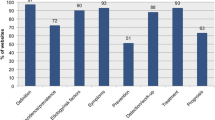Abstract
The Internet offers an easy and quick access to a vast amount of patient information. However, several studies point to the poor quality of many websites and the resulting hazards of false information. The aim of this study was to assess quality of information on thyroid cancer. A patients’ search for information about thyroid cancer on German websites was simulated using the search engine Google and the patient portal “Patienten-Information.de”. The websites were assessed using a standardized instrument with formal and content aspects from the German Cancer Society. Supporting the results of prior studies that analysed patient information on the Internet, the data showed that the quality of patient information on thyroid cancer is highly heterogeneous depending on the website providers. The majority of website providers are represented by media and health providers other than health insurances, practices and professionals offering patient information of relatively poor quality. Moreover, most websites offer patient information of low-quality content. Only a few trustworthy, high-quality websites exist. Especially Google, a common search engine, focuses more on the dissemination of information than on quality aspects. In order to improve the patient information from the Internet, the visibility of high-quality websites must be improved. For that, education programs to improve patients’ eHealth literacy are needed. A quick and easy evaluation tool for online information suited for patients should be implemented, and patients should be taught to integrate such a tool into their research process.


Similar content being viewed by others
Abbreviations
- afgis:
-
Action Forum on Health Information Systems
- ÄZQ:
-
Agency for Quality in Medicine
- DNEbM:
-
German Network for Evidence-Based Medicine
- GCS:
-
German Cancer Society
- HONcode:
-
Health on the Net Code of Conduct
References
Waldeyer A, Fanghänel J, Pera F (2009) Anatomie des Menschen. De Gruyter, Berlin
Mühlhauser I, Steckelberg A (2009) Evidenzbasierte Patienteninformation: Wünsche der Betroffenen. Dtsch Arztebl International 106(51–52):A-2554
Steckelberg A, Berger B, Köpke S, Heesen C, Mühlhauser I (2005) Kriterien für evidenzbasierte Patienteninformationen. Z ärztl Fortb Qualitätssich 99:343–351
Middel CE (2011) Ethische Aspekte von Patienteninformationen–Können Informationen auch schaden? Public Health Forum 19(1):10.e1–10.e3
Weber L (2011) Evidenzbasierte Patienteninformationen zu Asthma bronchiale. http://www.staempfliverlag.com/annot/564C42696D677C7C393738333635363137373336347C7C504446.?sq=2&title=Evidenzbasierte%20Patienteninformationen%20zu%20Asthma%20bronchiale. Last assessed 12 March 2016
Hirschberg I (2010) Bewertung und Wirkung von evidenzbasierten Gesundheitsinformationen-Die Perspektive der Nutzer. http://www.grin.com/de/e-book/158865/bewertung-und-wirkung-von-evidenzbasierten-gesundheitsinformationen-die. Last assessed 12 March 2016
Jazbinsek D (2000) (Hrsg.). Gesundheitskommunikation. Springer. ISBN 978-3-663-08098-5
Schaefer S, Kirschning S (2010) Gut informiert entscheiden: Patienten- und Verbraucherinformationen am ÄZQ. Z ärztl Fortb Qualitätssich 104(7):578–584
Domittner B (2011) Bedeutung und Einfluss von Online-Gesundheitsinformationen auf Beratungsleistungen gesundheitsinformierender Einrichtungen. http://www.fgoe.org/projektfoerderung/gefoerderte-projekte/FgoeProject_3034/61061.pdf. Last assessed 12 March 2016
Eichenberg C, Malberg D (2011) Gesundheitsinformationen im Internet. Psychotherapie im Dialog 12(2):128–134
Zschorlich B, Gechter D, Janßen S, Inger M, Swinehart T, Wiegard B, Koch K et al (2015) Z ärztl Fortb Qualitätssich 109:144–152
Fahy E, Hardikar R, Fox A, Mackay S (2014) Quality of patient health information on the Internet: reviewing a complex and evolving landscape. Austral Med J 7(1):24–29
https://www.afgis.de/. Last assessed 12 March 2016
https://www.healthonnet.org/HONcode/German/. Last assessed 12 March 2016
http://www.discern.de/. Last assessed 12 March 2016
Liebl P, Seilacher E, Koester MJ, Stellamanns J, Zel J, Huebner J (2015) What cancer patients find in the Internet: the visibility of evidence-based patient information—analysis of information on German websites. Oncol Res Treatm 38:212–218
Henf A, Wesselmann S, Huthmann D, Muenstedt K, Huebner J (2014) Complementary and alternative medicine in German cancer centers. Oncol Res Treat 37:390–394
Ärztliches Zentrum für Qualität in der Medizin: Patienteninformation.de. Ein Service der Bundesärztekammer und der Kassenärztlichen Bundesvereinigung. http://www.patienten-information.de/. Version: 2015. – [Online; Stand 14. Juni 2015]. Last assessed 12 March 2016
Chen H, Yu P, Hailey D, Wang N (2013) Methods for assessing the quality of data in public health information systems: a critical review. Studies Health Technol Inform 204:13–18
Fuchs T, Hanaya H, Seilacher E, Koester MJ, Keinki C, Liebl P, Huebner J (2016) Information deficits and second opinion seeking—a survey on cancer patients. Cancer Investig 28:1–8. doi:10.1080/07357907.2016.1242012
Ebel MD, Stellamanns J, Keinki C, Rudolph I, Huebner J (2015) Cancer patients and the internet: a survey among German cancer patients. J Cancer Educ 30:1–6
Neuhauser L, Kreps GL (2008) Online cancer communication: meeting the literacy, cultural and linguistic needs of diverse audiences. Patient Educ Couns 71(3):365–377
Kurz-Milcke E, Gigerenzer G, Martignon L (2008) Transparency in risk communication: graphical and analog tools. Ann N Y Acad Sci 1128:18–28
Garcia-Retamero R, Galesic M, Gigerenzer G (2010) Do icon arrays help reduce denominator neglect? Med Decis Mak 30(6):672–684
Author information
Authors and Affiliations
Corresponding author
Additional information
Jutta Huebner and Natalie Herth contributed equally.
Rights and permissions
About this article
Cite this article
Kuenzel, U., Monga Sindeu, T., Schroth, S. et al. Evaluation of the Quality of Online Information for Patients with Rare Cancers: Thyroid Cancer. J Canc Educ 33, 960–966 (2018). https://doi.org/10.1007/s13187-017-1173-z
Published:
Issue Date:
DOI: https://doi.org/10.1007/s13187-017-1173-z




